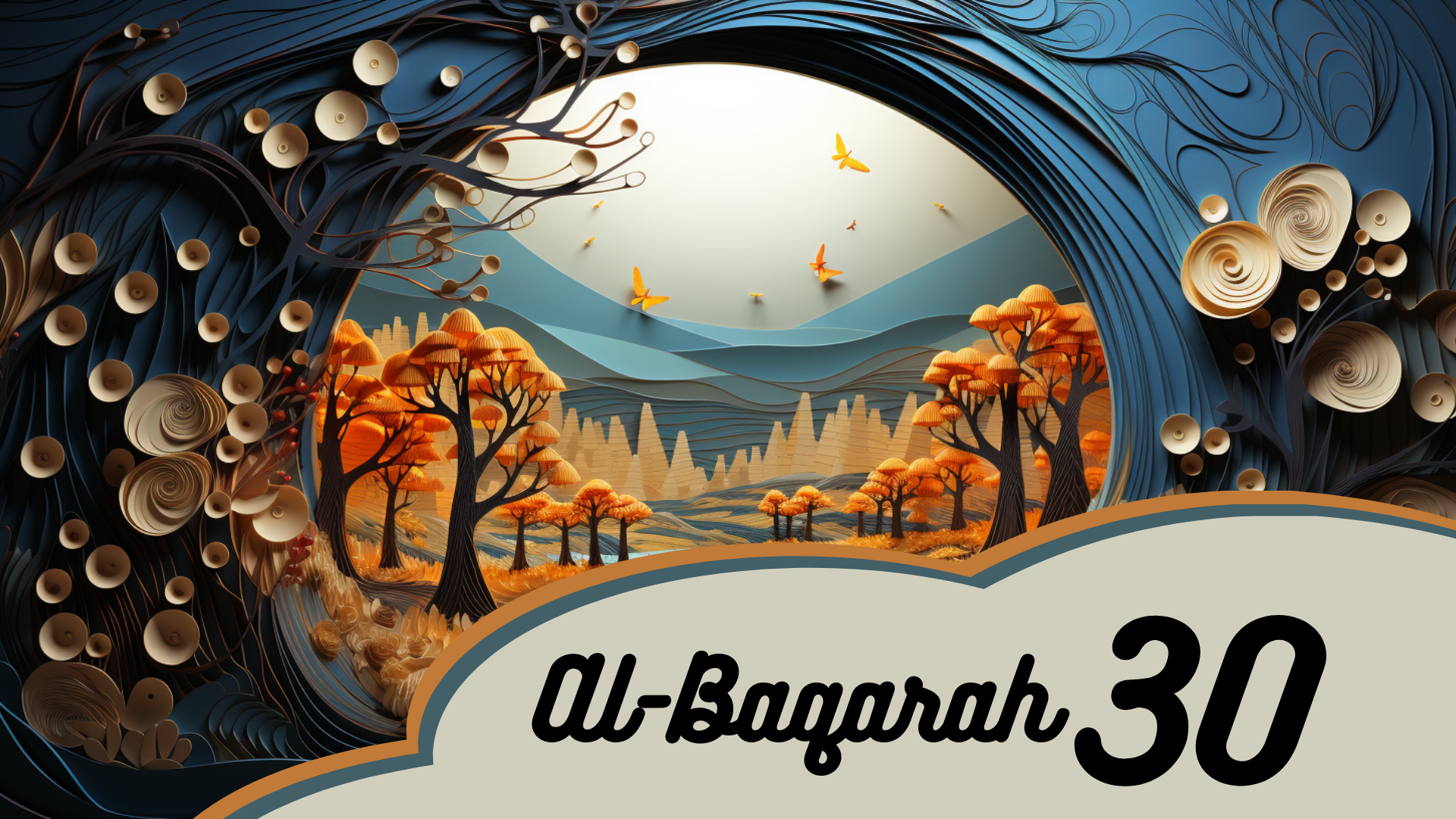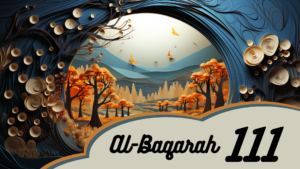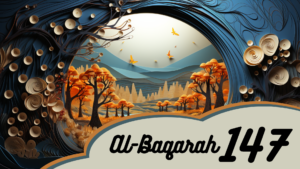In this article, we explore the profound meaning behind Verse 30 of Surah Al-Baqarah from the perspective of a Muslim’s daily life. As we delve into the intricacies of this verse, we uncover its significance and the ways in which it applies to our spiritual journey. Surah Al-Baqarah holds immense value for Muslims, and understanding the essence of Verse 30 allows us to reflect upon our purpose, identity, and relationship with our Creator. Join us as we dissect the words of this verse and unravel the wisdom it holds for believers.
The Background of Surah Al-Baqarah
Revelation of Surah Al-Baqarah
Surah Al-Baqarah, the second chapter of the Qur’an, was revealed to the Prophet Muhammad (peace be upon him) over a period of time during his stay in Madinah. It is the longest surah in the Qur’an, consisting of 286 verses in total. This surah covers a wide range of topics, including the stories of previous nations, laws and regulations pertaining to the Muslim community, and guidance for the believers.
Themes and Content of Surah Al-Baqarah
Surah Al-Baqarah addresses various themes and topics that are of vital importance to the Muslim community. It covers matters relating to faith, worship, morality, social justice, and the relationship between individuals and society. This surah provides comprehensive guidance and serves as a source of wisdom for Muslims in their daily lives. It also reinforces the importance of following God’s commandments and the consequences of straying from His path.
Understanding Verse 30
Translation and Text of Verse 30
The translation of verse 30 of Surah Al-Baqarah is as follows: “And [mention, O Muhammad], when your Lord said to the angels, ‘Indeed, I will make upon the earth a successive authority.’ They said, ‘Will You place upon it one who causes corruption therein and sheds blood, while we declare Your praise and sanctify You?’ Allah said, ‘Indeed, I know that which you do not know.'”
Context and Occasion of Revelation
The context of this verse dates back to the creation of Adam (peace be upon him) and his appointment as God’s vicegerent on Earth. The angels expressed their concerns about the possibility of humans causing corruption and shedding blood. This conversation between God and the angels provides valuable insight into the nature of human beings and the challenges they may face in fulfilling their role as vicegerents.
Explanation of the Verse
This verse highlights the unique position that God granted to humankind as His vicegerents on Earth. It shows that God bestowed upon humans a level of authority and responsibility, and that the angels were initially skeptical of this decision. However, God’s response indicates that His knowledge surpasses that of the angels, and He understands the potential for both good and evil in human beings. This verse serves as a reminder for humans to strive for righteousness and to fulfil the purpose for which they were created.
The Creation of Humanity
The Purpose of Creation
The creation of humanity holds great significance in Islam. Muslims believe that God created human beings to worship and serve Him, as stated in the Qur’an. It is through the fulfilment of this purpose that individuals can attain true contentment and spiritual growth. The purpose of creation encompasses the development of a strong relationship with God and striving to live virtuous lives that align with His commandments.
The Role of Humanity as God’s Vicegerents
God has chosen humans to be His vicegerents or representatives on Earth. This means that humans are entrusted with the responsibility of taking care of the Earth and its inhabitants, while also adhering to the laws and principles set forth by God. As vicegerents, humans are expected to exercise their authority with justice, compassion, and integrity. This role emphasizes the importance of stewardship, social responsibility, and striving for the betterment of society.
Adam and His Progeny
The Creation of Adam
Adam (peace be upon him) was the first human being created by God. According to Islamic teachings, Adam was created from clay and given life through the divine breath of God. He was placed in the Garden of Eden and given the ability to make choices. Adam’s creation carries a profound symbolism, representing the unity of humanity and the potential for spiritual growth and enlightenment.
The Prophets and Their Succession
Throughout history, God sent messengers and prophets to guide humanity and convey His message. These prophets were chosen to communicate God’s commandments, provide moral guidance, and rectify any misconceptions or deviations from the right path. The succession of prophets throughout time highlights the continuity of divine guidance and the role of these individuals in guiding humankind towards righteousness and closeness to God.
Adam as the First Prophet and Vicegerent of God
Adam is revered as the first prophet and vicegerent of God in Islam. He was given knowledge and wisdom by God, enabling him to fulfil his duties and responsibilities as a leader and caretaker of the Earth. Adam’s interactions with God, the angels, and his progeny serve as valuable lessons for individuals striving to fulfil their roles as vicegerents in the world today.
Satan’s Challenge and Humankind’s Choice
Satan’s Challenge to God
After the creation of Adam and the appointment of humanity as God’s vicegerents, Satan challenged God’s decision. Satan’s arrogance and refusal to bow down before Adam out of jealousy led to his expulsion from the heavens. His challenge to God’s authority serves as a reminder of the ongoing struggle between good and evil, and the need for humans to continuously strive towards righteousness and resist temptations.
The Choice Given to Humankind
Humankind has been given the freedom to choose between good and evil, righteousness and sin. The story of Adam and Eve (Hawwa) exemplifies the consequences of making choices that go against God’s commandments. This story emphasizes the importance of exercising free will responsibly and the need for self-discipline and self-control. Humans must be aware of the temptations and distractions that can lead them astray from their purpose and strive to make choices that align with God’s guidance.
The Role of Knowledge and Intellect
The Symbolism of God Teaching Adam Names
In Surah Al-Baqarah, it is mentioned that God taught Adam the names of all things. This symbolic act represents the superiority of humans over other creations due to their ability to acquire knowledge and utilize their intellect. The comprehension and application of knowledge play a crucial role in fulfilling the responsibilities entrusted to humans as God’s vicegerents. It is through knowledge that humans can make informed decisions, develop critical thinking skills, and contribute positively to society.
The Importance of Knowledge and Intellect in Human Life
Islam places great emphasis on seeking knowledge and acquiring wisdom. Muslims are encouraged to pursue education, engage in critical thinking, and be active learners throughout their lives. Knowledge expands individuals’ understanding of the world, enhances their ability to solve problems, and facilitates personal and societal development. Intellect, combined with moral and ethical values, enables individuals to make sound judgments and lead purposeful lives.
The Significance of Free Will
The Concept of Free Will
Islam acknowledges the concept of free will, allowing individuals to make choices and be accountable for their actions. Humans have been given the freedom to choose between good and evil, right and wrong. This freedom is a test, as it determines an individual’s character and moral fibre. Free will grants humans the opportunity to cultivate their relationship with God, seek knowledge, and display acts of virtue and compassion.
The Consequences of Our Choices
The choices made by individuals have consequences that shape their lives and impact the world around them. Islam teaches that individuals are responsible for their actions and will be held accountable on the Day of Judgment. Good choices bring rewards and blessings, while bad choices lead to negative consequences in both this life and the hereafter. Understanding the weight of our choices emphasizes the importance of making conscious decisions in accordance with God’s guidance.
The Implications for Muslims Today
Lessons and Reflections from Verse 30
Verse 30 of Surah Al-Baqarah reminds Muslims of their role as vicegerents of God on Earth and the responsibility that comes with it. It serves as a call to action, urging individuals to strive for righteousness, promote justice, and contribute positively to society. The verse also emphasizes the importance of recognizing the potential for both good and evil within humanity and encourages individuals to make choices that align with God’s commandments.
The Application of Verse 30 in Daily Life
Muslims can apply the teachings of verse 30 in various aspects of their daily lives. They can strive to fulfil their responsibilities as vicegerents by actively participating in efforts to protect the environment, promote social justice, and contribute to the well-being of others. Applying the principles of justice, compassion, and integrity in their interactions with others and in their personal conduct enables Muslims to embody the values emphasized in this verse and live purposeful lives.
The Importance of Reflection and Worship
Reflecting on God’s Signs and Verses
Islam encourages believers to reflect upon the signs of God in the universe and within themselves. Reflecting on the miracles of creation, the complexity of the human body, and the wonders of the natural world deepens one’s connection with God and reinforces faith. Additionally, contemplating the verses of the Qur’an and understanding their meanings allows Muslims to gain wisdom, find guidance, and strengthen their spiritual journey.
Worshipping God and Fulfilling Our Purpose
Worship is an integral part of a Muslim’s life, as it allows individuals to express their gratitude, seek forgiveness, and strengthen their relationship with God. Through acts of worship such as prayer, fasting, charity, and pilgrimage, Muslims can fulfil their purpose of worshipping and serving God. Worship serves as a means of self-discipline, self-improvement, and spiritual growth, enabling individuals to become better vicegerents and live in harmony with God’s commandments.
The Relationship Between Man and God
Submission and Obedience to God
Submission and obedience to God are fundamental principles emphasized in Islam. Muslims recognize God’s authority and sovereignty and strive to submit to His will in all aspects of life. This submission is a manifestation of one’s faith and a recognition of God’s wisdom and guidance. Obedience to God’s commandments is seen as a means of attaining spiritual growth, peace, and tranquillity.
Seeking Guidance from God
Islam encourages believers to actively seek guidance from God through prayer, supplication, and sincere intention. Muslims believe that God is accessible and responsive to the needs and supplications of His servants. Seeking guidance from God allows individuals to make informed decisions, find clarity in times of confusion, and seek help in overcoming challenges. It is through this relationship of seeking and following divine guidance that individuals can navigate the complexities of life with conviction and certainty.
In conclusion, verse 30 of Surah Al-Baqarah conveys important messages regarding the creation of humanity, the role of humans as God’s vicegerents, the significance of free will, the importance of knowledge and intellect, and the need for reflection, worship, and obedience to God. Understanding and applying the teachings of this verse can greatly impact the lives of Muslims by guiding them to live purposeful lives, contribute positively to society, and deepen their relationship with God.




